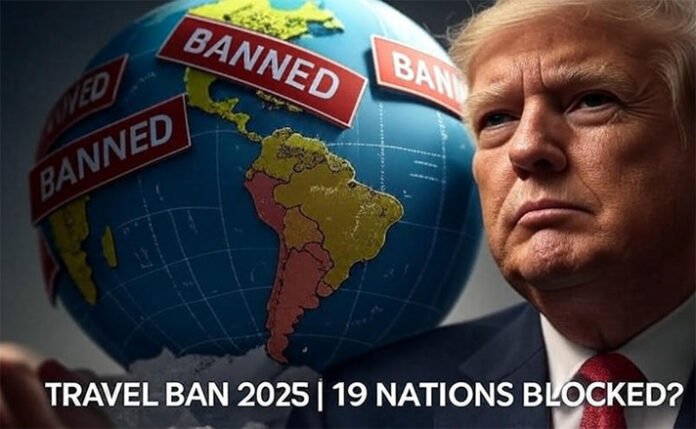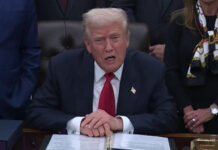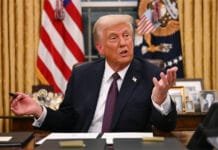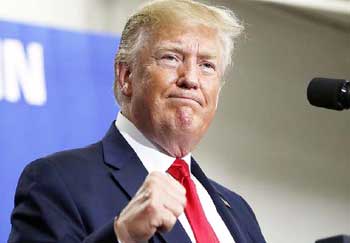
INVC NEWS
Washington, DC — : Tougher immigration controls have taken effect in the United States as President Donald Trump’s sweeping new travel ban begins today, restricting entry from 19 nations, many of them Muslim-majority or African countries. This policy move is triggering global concern, especially among families with ties to these regions.
The new order, signed last Wednesday, blocks entry for travelers from Afghanistan, Burma (Myanmar), Chad, Republic of Congo, Equatorial Guinea, Eritrea, Haiti, Iran, Libya, Somalia, Sudan, and Yemen. An additional seven countries—Burundi, Cuba, Laos, Sierra Leone, Togo, Turkmenistan, and Venezuela—also face strict limitations under the new regulation. Applicants from these countries without valid U.S. visas now face automatic rejection unless they qualify for an exemption.
US Embassies Told to Follow Immediate Implementation
Clear instructions have been sent to all American embassies and consulates worldwide. While existing visas remain valid, any new visa applications from the listed countries will be declined unless the applicant meets very narrow exemption criteria. These restrictions are part of a broader Trump immigration agenda that’s resurfacing during a time of heightened tension over border enforcement in the U.S.
According to internal State Department communications, the move aims to tighten border security and vet foreign nationals more aggressively. Still, critics argue that many affected are students, professionals, and families, not individuals posing any security threat.
Echoes of the 2017 ‘Muslim Ban’ Spark Global Reaction
This isn’t Trump’s first attempt to enforce strict travel restrictions. Back in January 2017, during his initial term as President, Trump signed an executive order barring entry from seven Muslim-majority countries—Iraq, Syria, Iran, Sudan, Libya, Somalia, and Yemen. That order sparked mass protests, global backlash, and legal battles.
Many travelers were stopped at airports, and others were forced to return to their countries mid-journey. Families were separated, and even students with valid visas were denied entry. The order was labeled the ‘Muslim Ban’, a term that Trump officials rejected, yet it gained widespread usage in media and legal discourse.
Eventually, the Supreme Court in 2018 upheld a revised version of the travel ban, cementing its place in U.S. immigration policy. Now, with the new expanded list of countries, many are drawing clear parallels to the past.
Who Is Affected by the New Ban?
The newly expanded ban affects a wide range of individuals:
Students, even those with admission offers.
Business travelers, investors, and entrepreneurs.
Tourists and family visitors planning reunions.
Government officials and diplomats from select nations.
Refugees and asylum seekers facing persecution at home.
It also severely impacts immigrants applying for Green Cards or visas based on employment, family reunification, or humanitarian reasons. The lack of clarity around “exceptions” is creating confusion among visa applicants and legal advocates.
Muslim Nations Once Again at the Center of Controversy
A majority of the countries targeted under this new policy have significant Muslim populations, which is once again raising concerns of discrimination masked as security policy. Critics argue that the repeated focus on Muslim-majority regions reinforces Islamophobic narratives, despite Trump’s claim that “the travel ban is about safety, not religion.”
Legal experts point out that the language of the executive order avoids religious references but disproportionately targets nations with active Muslim communities, making its intent appear politically and racially motivated.
Visa System Tightens, But Older Visas Remain Valid
According to the State Department, individuals who already hold valid U.S. visas from these countries will not have them canceled. However, any new applications post-ban activation will face rejection, unless the applicant falls into a very limited exception category—such as emergency medical cases or key diplomatic figures.
That said, advocates fear that embassy-level discretion may lead to inconsistent outcomes, and even those who technically qualify for exemptions may be denied due to procedural ambiguity or political pressure.
Tensions Rise as Communities Brace for Separation and Uncertainty
Families are now scrambling. Those who were planning reunions, education, weddings, or even medical treatment in the U.S. are now stuck in limbo. Many face the grim possibility of missing out on key life events or being cut off from loved ones indefinitely.
Immigration lawyers are already seeing a surge in emergency consultation requests from affected citizens. Travel agents report mass cancellations of flights and visa interview appointments from the restricted countries.
This new policy is expected to have significant humanitarian, economic, and diplomatic repercussions, especially in countries like Iran, Yemen, Sudan, and Somalia, where many citizens maintain strong familial and educational ties to the United States.















